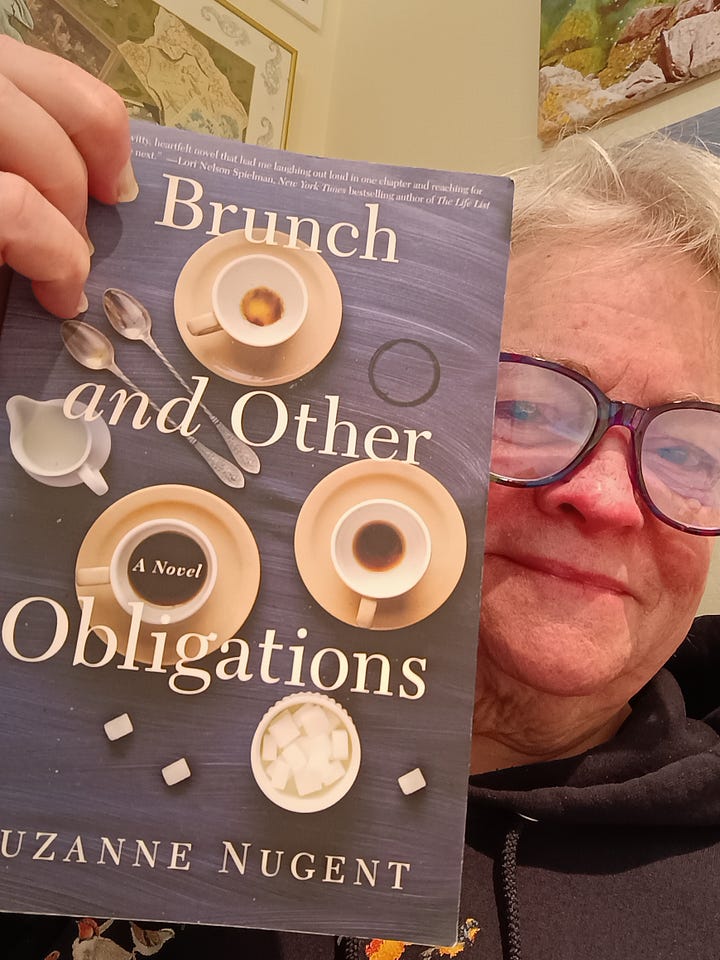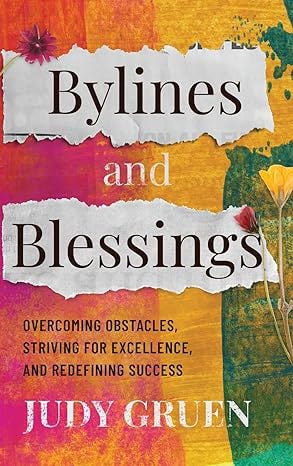Thank you for your interest in Lynne Golodner’s Rebel Author Newsletter! This weekly missive focuses on writing and publishing, and I send it to my audience free as a gift. If you find value here, and want to support a working writer, please consider becoming a paid subscriber. Paid subscribers qualify for monthly book giveaways and bimonthly writing coaching calls. (The next one is March 27th at 12 pm ET.) It’s also wonderful if you choose to comment or share this with others. Thanks for reading!
Congratulations to our February book giveaway winner - Claire Newman! I’ll be sending you The Henna Artist by Alka Joshi. And please enjoy these photos of our January book giveaway winners, Carol Roehrig and Erin Sim. Thanks to all paid subscribers for funding this effort!


I love how writers’ paths cross in such inevitable ways. Although I just met Judy Gruen when I was in Los Angeles on book tour, I feel like I’ve seen her around the internet for a really long time. Judy attended my talk at Temple Beth Am in Beverly Hills, and listened as I shared about how my novel, WOMAN OF VALOR, focuses on an Orthodox Jewish main character who must decide whether to remain religious or abandon the identity she chose. Judy thanked me for showing the beauty of Orthodox observance despite my personal experience of leaving that lifestyle after a decade.
But if you know me, you know that my author brand focuses on creating compelling Jewish characters. You know, too, that I want to fill the world with strong Jewish identity, both in real life and on the page. (By the way - what’s your author brand? Stay tuned for a future issue devoted to this very topic.)
This week, I’d like to share an author interview with Judy Gruen, while the Make Meaning Podcast is on hiatus.

Author Interview: Meet Judy Gruen
Tell me about your first memory of writing - how old were you? What feelings did writing bring you? What were early responses to your writing?
I was about six years old, scrawling a story about an animal that escaped from a zoo. I can clearly remember a feeling of creative agency, though I did not have the vocabulary to name it; it just felt exciting, a mysterious but powerful potential: what would happen in this story? I got to decide! I also remember that my mother’s best friend, Eleanor, saw me writing and laughed. She said, “If I gave Eric (her son) paper and a pencil, he’d just tear it up.” That shocked me! Why would someone waste a perfectly good piece of writing paper?
I had loving parents and grandparents who encouraged and praised all my efforts. My vocabulary and skill grew quickly. By the time I was eight or nine, my grandmother Cece said, “Judy, when you grow up, I know that you’re going to become a writer.” That was a thrilling moment for me, which I write about in the introduction to my new memoir, Bylines and Blessings. My grandmother understood my deepest longings and validated them. That gave me such a feeling of affirmation—my own grandmother, a trailblazing holistic physician--believed in me and my dreams.
What do you most love to write, and why?
I’ve always been a non-fiction writer: features, profiles, essays, book reviews, and books, but the personal essay is my favorite. It’s always a challenge to go beyond what I’ve done before. Still, knowing what it takes and creating it on the page are two different things. There is no real “recipe” for structuring the personal essay. As long as you’re moving the reader with your story, and each sentence builds meaningfully on the one that came before, and you keep the reader engaged through crisp, evocative, clear language, you’re writing a good essay.
What was the inspiration for this project? What was its journey? Any roadblocks along the way?
My new book, Bylines and Blessings, is my most significant writing project of recent years. It’s my fifth book and second memoir. Earlier in my career, I never envisioned writing even one memoir, let alone two. I wrote the first one, The Skeptic and the Rabbi: Falling in Love with Faith, as a protest against a publishing trend favoring anti-Orthodox memoirs that began around 2012. These books pained me because publishers rushed to show Judaism at its narrowest, most confining borders, written by people who were clearly alienated from that life, and perhaps for good reason. Still, some of these writers had no “platform” or even much of a writing record, but their anti-Orthodox stories reinforced the comforting stereotypes about Jewish Orthodoxy among publishers, book reviewers, and other cultural arbiters. This was part of a long-term and ongoing bias against religious tradition in publishing—and in the culture at large-- that had upset me for years.
Choosing an Orthodox life after growing up secular was the hardest decision of my life, but also the most transformative and blessed one.
I felt protective about my tribe and needed to take a stand against slanted, and sometimes slanderous, views of Orthodoxy-as-misery. Orthodoxy’s beautiful side—flawed and complicated but still beautiful and rich and deep—was getting no airtime among the general reading public.
About three years ago, I started blogging about my journalism career. These stories were not only entertaining but held important lessons about persistence, pursuit of excellence in craft, and infusing one’s career and life with faith values. My growing commitment to Jewish values, practice and study had changed me and enriched me both professionally and personally. It helped me redefine success and find blessings in the bylines.
There were roadblocks. First, writing, selling, and marketing a memoir is tremendously hard work with an uncertain return on investment. I showed my first half-dozen blogs, about 12,000 words in total, to a developmental editor named Howard Lovy and asked him honestly: Is there something here? He and another mentor of mine, Sun Cooper of Sun Literary, felt I had something of value that just needed development. I worked with Howard for more than a year as he guided me toward fleshing out the stories.
But even with Howard’s and Sun’s encouragement, I was skittish. A book can break your heart. I was afraid of expending energy, time, money, and emotion only to be disappointed. I hired a life coach named Jill Kahn, who helped me free myself from those fears.
What is hardest about being a career author? What do you love most about it?
For decades, it was hard for me to make peace with how hard I work and the lack of financial compensation. I had stabs of envy over debut authors who rocketed to literary stardom, whether their work really was excellent or whether the stars simply aligned for them and there was a certain luck, or mazal, involved. I envied journalists whose stars were rising while mine seemed stuck in neutral. But my influence and craft grew, and I knew my writing had impact.
My husband, Jeff, and I have discussed this so many times. He says my value as a writer will never be measured in dollars but in impact. He sometimes envies the way I’m recognized for my work. A businessman, he’s often asked, “Are you Judy Gruen’s husband?”
I love sitting down to create something new each day. Using the old noggin to find more creative, fresh words and phrases, dismissing the old and shopworn. I like to write in ways that are unexpected, stimulating but not jarring. This keeps me in a constant state of growth. I love writing about people and their journeys, about relationships and connections.
Can you share an unusual or inspiring story about your writing journey?
My first book, Carpool Tunnel Syndrome, was published shortly before 9/11. My first big book launch event was scheduled at the Jewish Federation of Los Angeles to be held on Sept 11, 2001. We’d promoted it heavily, and I was so excited. Of course, that event never happened.
After 9/11, lots of people were asking, “Is anything ever going to be funny again?” My book had humor in it, and I began questioning my work as a humorist. I spoke to my rabbi about this, and he said, “Keep writing. We need laughter more than ever.”
When I had another mini crisis of faith about my work, during a difficult personal time in my life, another rabbi reassured me that my work mattered.
“Creativity is energy,” he said. I taped that phrase to my computer.
Finally, I received an email from a woman who was extremely ill and had read a humor piece of mine in Woman’s Day while sitting in a doctor’s office. She said she laughed so much I had “saved her life.” I was thunderstruck that she perceived my writing in that way.
What advice would you offer aspiring writers?
Commit to excellence.
Be prepared to work very hard.
Learn from good teachers and editors, and don’t take criticism of your writing personally. Too many writers let their egos get in the way.
A good editor or writing coach wants to help you achieve a higher level of creative ability. Don’t confuse your sense of self with your writing, even when you are writing about something personal. It’s the hallmark of a professional to take constructive criticism well.
Aim high. Read outstanding writers to learn what is possible.
Words create worlds, and your potential to create and build a more beautiful world is immense!






Love this phrase from Judy Gruen: "my value as a writer will never be measured in dollars but in impact."
Thank you, Lynne, for giving me the special gift of sharing these thoughts about writing with your readers. You asked great questions and I enjoyed the interview so much!